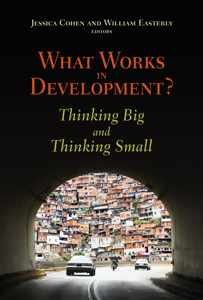The Counter-Revolution of Development Economics: Hayek vs. Duflo
This post is by Adam Martin, a post-doctoral fellow at DRI.
 F.A. Hayek, well known as a critic of central planning, also criticized what he called “scientism,” a blind commitment to the methods of the physical sciences beyond their realm of applicability. In The Counter-Revolution of Science, Hayek opposed to “scientism” the genuine spirit of scientific inquiry.
F.A. Hayek, well known as a critic of central planning, also criticized what he called “scientism,” a blind commitment to the methods of the physical sciences beyond their realm of applicability. In The Counter-Revolution of Science, Hayek opposed to “scientism” the genuine spirit of scientific inquiry.
Esther Duflo’s emphasis on small-scale experimentation has affinity with Hayek’s critique of grand schemes of central planning. As Duflo said in an interview with Philanthropy Action: “I think another untested and potentially wrong idea is that you have to do everything at the same time or else. This is a pretty convenient untested belief because if you live in that world, it is almost impossible to evaluate what you do.”
But Hayek’s concerns about “scientism” might yet apply to Duflo. She continues in the same interview:
Whereas if you say, I am going to press on this button and see whether it provides this result, you might find there are many things that do work surprisingly well with surprising consistency. So it is not that the world is so incredibly complex that every place needs a unique combination of five factors just to produce anything. I don’t know that we would have been able to say the same thing five years ago, but now we are starting to be in the position to say that a number of things, if well designed, just work pretty well in a lot of contexts.
Hayek, in contrast, argues that sheer, context-independent experimentation is not a viable path to development:
An experiment can tell us only whether any innovation does or does not fit into a given framework. But to hope that we can build a coherent order by random experimentation with particular solutions of individual problems and without following guiding principles is an illusion. Experience tells us much about the effectiveness of different social and economic systems as a whole. But an order of the complexity of modern society can be designed neither as a whole, nor by shaping each part separately without regard to the rest, but only by consistently adhering to certain principles throughout a process of evolution. (Law, Legislation, and Liberty Vol. I, p. 60)
Experimentation, for Hayek as well as Duflo, is the chief instrument of social change. Making experimentation work for development requires institutional feedback mechanisms which can fit together newly-discovered ways of doing things in mutually reinforcing ways. What Hayek defends as "liberal" principles are the ways of coordinating individual experiments in a way that enhances human welfare. Ad hoc, "pragmatic" approaches might solve some local problem, but without coordination with other projects the progress will not be reinforcing and self-sustaining.
Promoting progress is like playing leap-frog in the dark. Big leaps into the unknown can easily end in disaster. Experiments are small leaps. Only when we combine those small leaps together according to some rules do we leap-frog in a definite direction and reinforce each other's progress, rather than ambling about and running into each other. Without systematic feedback mechanisms that are effective at coordinating different projects, randomized trials are like those small leaps. They might be able to solve particular problems--especially in mitigating the ill effects of poverty--but they would not lead to the self-reinforcing process of wealth generation necessary to eliminate poverty.
 From Aid to Equality
From Aid to Equality



 After my
After my 